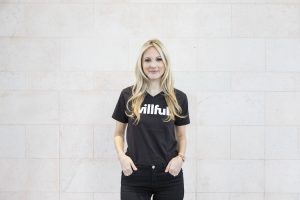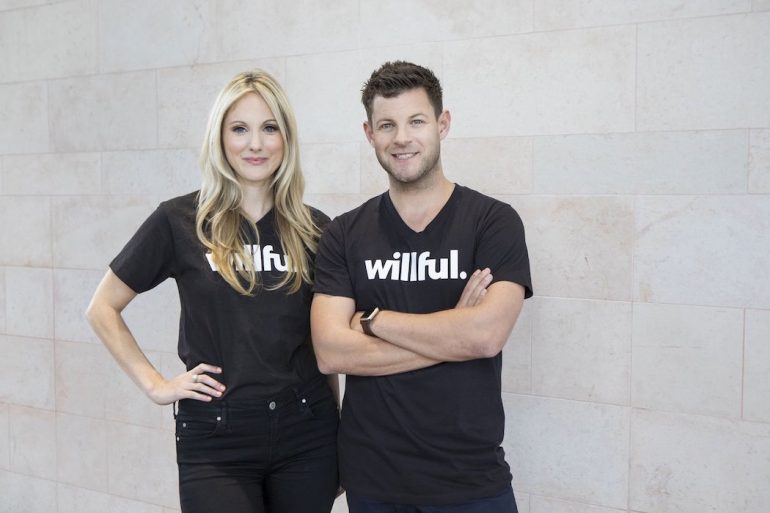Kevin Oulds and Erin Bury entered the Dragons’ Den in June to pitch their death tech startup Willful. It was a move that could have seen them walk away without a deal and even risk their brand before a national television audience.
Oulds, a Dragons’ Den fan for years, told BetaKit while he’d wished to pitch on the popular television show, he knew how ruthless the dragons could be when it came to their evaluations of businesses.
“It was kind of scary thinking we can’t control the outcome,” Oulds said.
“We thought Dragons’ Den would be a great way to reach those folks and to test out the power of TV.”
Thursday night Oulds and Bury appeared on the show in the episode filmed in June hoping for $500,000 for a five percent investment in their estate planning company. The couple left having signed a deal with Clearco co-founder and Dragons’ Den star, Michele Romanow.
After the show, other notable angel investors, family offices, and strategic investors, including Conconi Growth Partners, contributed to bringing the bridge financing round to a total of $750,000 CAD. Willful did not disclose Romanow’s final portion of the investment round (Disclosure: BetaKit Director of Operations Laura Gabor is an investor in Willful).
The round closed at the end of October. It’s the first funding raise for Willful since its seed round of $800,000 in 2020.
The startup’s online platform offers estate planning services, including the creation of a legal will and assigning a power of attorney for personal care and property.
In order to ensure the best outcome on Dragons’ Den, Oulds and Bury hired Speaker Labs, a professional company that specializes in training people for public speaking, to help them create and refine their pitch. “After that we practiced and practiced,” relentlessly Oulds recalled.
The couple watched past seasons of the Dragons’ Den, and made a list of the more than 30 questions they anticipated they’d be asked. They wrote out all the answers and practiced those in front of family, friends, and investors. “Just before going on there were a bit of nerves but we were very prepared, and after the fact we didn’t really feel nervous as soon as we started talking,” Oulds said. “It went very well.”
RELATED: Willful acquires competitor WillowBee as it prepares for expansion to new provinces
Oulds and Bury had another, practical reason for appearing on Dragons’ Den. One of their secondary markets is boomers and retirees, and so television seemed like a good way to market to those who are older, and maybe a bit less tech-savvy.
“We thought Dragons’ Den would be a great way to reach those folks and to test out the power of TV,” Bury said. “When you’re a startup on a limited marketing budget, you don’t have the money to buy TV commercials and air time.”
The new funds will go toward hiring a couple of key staff positions, and investing in marketing, distribution, and product development. The funds will also help see the startup through to 2022 when it plans a Series A raise.
Romanow told BetaKit: “Willful is solving a problem that none of us want to think about or deal with – until you have to. And then, at the worst possible moment of your life, you’re trying to find lawyers, go through a ton of paperwork, make expensive decisions and potentially fight with your family.”
She added that “estate planning is something every Canadian will face and Willful has found a way to use technology to simplify a daunting process.”
Romanow noted that she invests in tech startups that she believes she can scale, and called Oulds and Bury “incredibly smart operators” who had previous experience at other startups. “That kind of experience is important because it tells me you’ve had to constantly solve problems, test your ideas, fail fast and iterate – over and over again,” Romanow said. “It’s what makes you a great founder.”
Willful partners with estate lawyers in each province to draft its legal content, and to keep that content up to date as legislation changes. Willful’s platform guides people through a series of questions about their life situation and helps them to appoint key roles like executors and beneficiaries.

Once the relevant information for their end-of-life wishes has been gathered, Willful provides customized legal documents supported by detailed instructions outlining how to execute the will in accordance with provincial requirements.
Willful was the first company to offer a fully digital notarial will in Quebec, which can be completed online without the need to physically print or consult a notary in person.
On December 1, Willful also helped execute one of the first fully digital wills in Canadian history after British Columbia’s new legislation came into effect, which allows for the electronic signing, virtual witnessing, and online storage of wills.
Before BC enacted Bill 21, digital wills in Canada weren’t considered legal documents. Currently, BC is the only province that allows digital signing and storage of wills, a provision to make creating a will more accessible during the pandemic.
On the same day, Willful competitor LegalWills.ca (which had partnered with Syngrafii, a virtual signature startup) also claimed to be the first to execute a fully digital will.
Willful has partnered with DocuSign to launch a new pilot program offering fully digital will creation and execution for BC residents, a program that is approved by the Law Society of BC as part of their Innovation Sandbox program.
While Willful shares the space with LegalWills.ca in Canada, Bury said generally there’s not much competition in Canada in the death tech space. “Our opinion is there are 16 million Canadian adults who don’t have a will and so the more people who are shining a spotlight on this and doing the work to get people wills the better,” she said.
Does being labelled a “death tech” startup disturb Oulds and Bury? Not at all. Bury says the term is common among founders in the space. “We like being lumped into that,” Bury said. “People don’t really know where to categorize us: are we legal tech, FinTech, death tech. We don’t really care. We kind of categorize ourselves as a bit of all three.”
Willful launched in 2017 after a family member of Oulds and Bury passed away unexpectedly. Oulds said everyone in the family was unprepared for the tasks necessary to close up someone’s life. “After that a couple of close run-ins, medical issues with myself made me think of my own mortality, and hey, this death thing is something people should think about more than we do,” Oulds said.
The 15-person startup claims to have helped 20,000 people prepare their wills since it launched.
Looking to the future, Oulds and Bury said the most natural product extension for Willful is the ability to compile and store other information, such as asset lists, and funeral and burial wishes. Bury said the startup hopes to launch a product along those lines in the new year.
Image courtesy Erin Bury. Credit: Becca Lemire Photography


